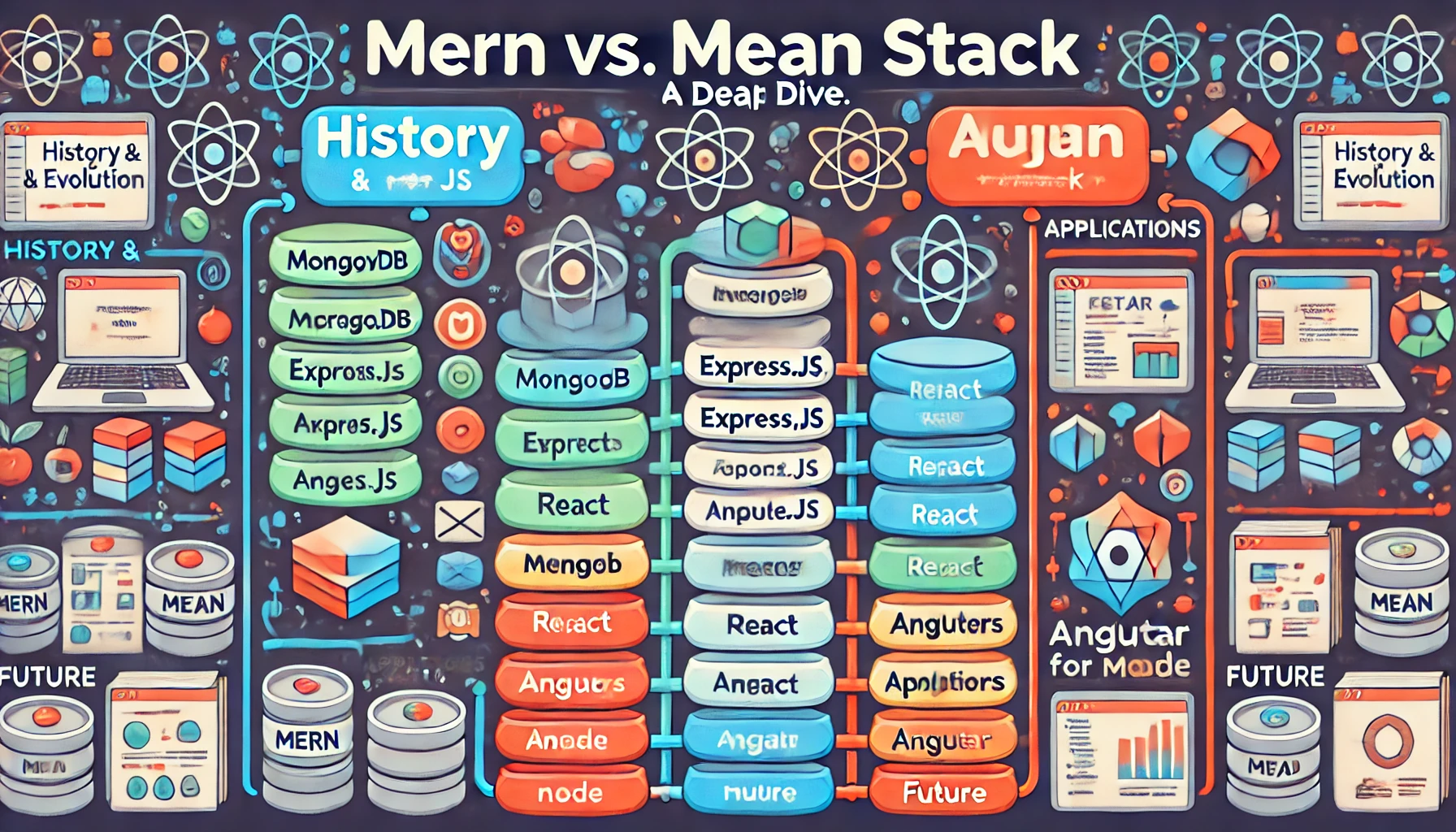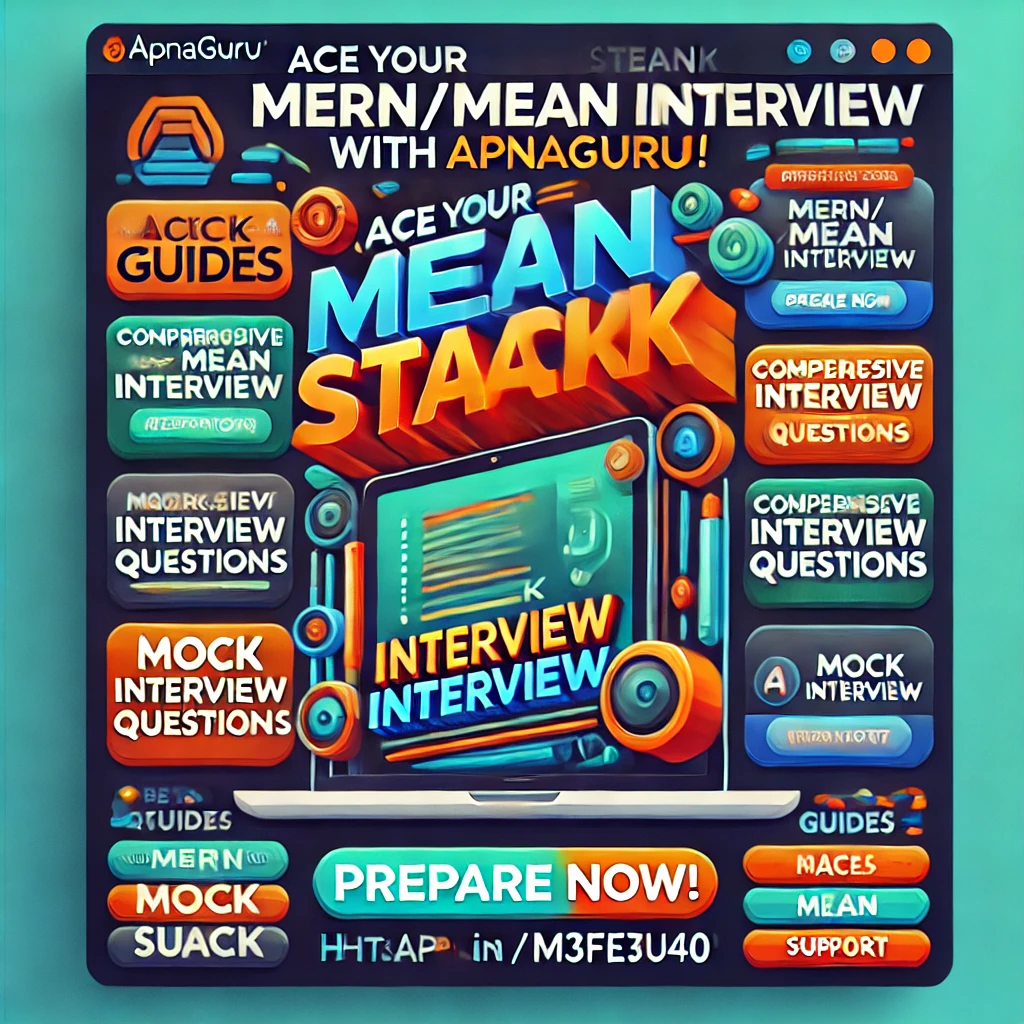MERN vs. MEAN Stack: Which JavaScript Framework Is Right for You?
In the realm of full-stack JavaScript development, two frameworks—MERN and MEAN—stand out for building high-performance, robust, and scalable web applications. Each stack offers a unique combination of tools and libraries. MERN (MongoDB, Express.js, React, Node.js) and MEAN (MongoDB, Express.js, Angular, Node.js) share many similarities but differ significantly in their front-end frameworks, each suited to different application types and development styles. Here, we’ll explore the history, evolution, pros and cons, applications, and future potential of these two stacks to help you choose the right one for your projects.
Introduction
The Origins
MEAN Stack: As the demand for JavaScript-driven web development surged in the early 2010s, the MEAN stack was created to simplify and streamline full-stack JavaScript applications. The MEAN stack combines MongoDB for its flexible NoSQL database structure, Express.js as a lightweight server framework, Angular for a structured front-end framework, and Node.js for fast server-side JavaScript execution. MEAN quickly gained popularity because it enabled a consistent programming language (JavaScript) across the entire application stack.
MERN Stack: Shortly after, the MERN stack emerged as an alternative, replacing Angular with React, a component-based front-end library from Facebook. React brought a new level of flexibility to front-end design, making it easier to create interactive UIs for single-page applications (SPAs). This transition from Angular to React led to the MERN stack, which gained popularity among developers aiming for greater control over the front end and faster DOM rendering.
Evolution and Adoption
Angular and React have both evolved significantly, with Angular transforming into Angular 2+ with a component-based architecture, and React introducing hooks for more manageable state handling. MEAN became a go-to choice for large applications where MVC architecture is crucial, while MERN gained traction for SPAs and dynamic content management systems (CMS) due to React’s fast-rendering virtual DOM.
Past and Present of MERN and MEAN Stacks
Past
In the beginning, MEAN’s MVC framework was attractive because it helped developers handle data efficiently across large applications. Angular’s dependency injection and built-in data-binding appealed to enterprise developers. MERN, on the other hand, brought flexibility to front-end applications, and its modularity made it appealing to startups and developers focused on interactive UIs.
Present
Currently, both stacks enjoy widespread use. MEAN is often seen in applications where data-driven architecture and clear structure are essential, such as customer relationship management (CRM) systems and enterprise applications. MERN has become synonymous with agile development, allowing developers to create rapid prototypes and iterate features quickly. React’s vibrant ecosystem and powerful rendering capabilities make it popular for e-commerce and social media applications.
Future of MERN and MEAN Stacks
MERN Stack
With React’s extensive support and Facebook’s continuous investment, MERN is expected to remain strong in areas that demand interactive, real-time, and single-page applications. React’s ecosystem, combined with libraries like Next.js, has brought server-side rendering and static site generation into the fold, expanding MERN’s potential in SEO-friendly applications.
MEAN Stack
MEAN’s structure, supported by Google’s continued development of Angular, is likely to persist in enterprise environments. The stack's MVC nature and support for large, modular applications make it a reliable choice for business-critical applications where maintainability and scalability are paramount. Angular’s move towards WebAssembly also signals potential performance improvements.
Advantages of MERN and MEAN Stacks
- React (component-based, flexible)
- Angular (MVC-based, structured)
- DOM Handling
- Virtual DOM, faster rendering
- Real DOM, built-in data binding
- Ease of Learning
- Simple syntax, modular components
- Slightly steeper learning curve
- Scalability
- Great for dynamic, component-driven UIs
- Ideal for large-scale applications

Additional Advantages:
- MERN provides a modern, fluid user experience and is often considered “lighter” than MEAN due to React’s flexibility and ease of integration with other libraries.
- MEAN offers a clear structure with Angular’s MVC pattern, making it highly suitable for organized, large-scale, data-intensive applications that require a defined flow and separation of concerns.
Uses and Applications of MERN and MEAN Stacks
MERN Stack Applications
- The MERN stack is popular in modern web applications that require an interactive user experience. It’s frequently used for:
- E-commerce platforms with real-time product updates and a customizable UI.
- Social media networks with user-generated content and high user interactivity.
- Single-Page Applications (SPAs) where fast UI rendering is critical.
- Project management tools with responsive interfaces and collaborative features.
MEAN Stack Applications
- MEAN is well-suited for structured applications where scalability and performance matter. Common uses include:
- Customer Relationship Management (CRM) applications that manage complex data flows.
- Enterprise-level applications requiring robust architecture and modularity.
- Content Management Systems (CMS) for organized, data-heavy sites.
- Financial services and banking applications with a focus on structured data handling.
Key Differences Between MERN and MEAN
- Rendering Speed: MERN’s virtual DOM allows for faster updates and is optimized for performance in SPAs, whereas MEAN’s real DOM is more beneficial in complex data manipulation.
- Learning Curve: MERN’s React offers an easier learning experience, whereas MEAN’s Angular has a steeper learning curve due to its structure and features like dependency injection.
- Structure and Scalability: MEAN is better suited for large applications with clear architectural needs, whereas MERN’s flexibility allows for quicker prototyping and iteration.
Elevate Your MERN/MEAN Stack Skills with ApnaGuru

Looking to ace your MERN/MEAN Stack interviews? ApnaGuru has all the resources you need! Our expert-curated study materials cover every aspect of these stacks, from foundational concepts to advanced problem-solving skills. Whether you're new or experienced, ApnaGuru’s materials will guide you step-by-step through your interview preparation journey.
Discover more at ApnaGuru’s MERN/MEAN Interview Preparation. Our comprehensive guides, mock interview questions, and community support make mastering these stacks easier than ever. Join ApnaGuru now at ApnaGuru’s MERN/MEAN Preparation and start building your future today!
Conclusion
Choosing between MERN and MEAN depends on your project’s goals, scalability requirements, and developer skill set. If your project requires a scalable, MVC-based structure, MEAN might be the best fit, especially for enterprise solutions. However, if you’re looking for a dynamic, component-based front end, MERN is ideal for SPAs and interactive applications. Both stacks are here to stay, thanks to JavaScript’s dominance, so selecting one comes down to the specific strengths and characteristics of each.